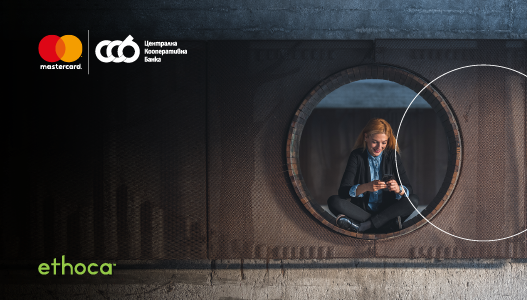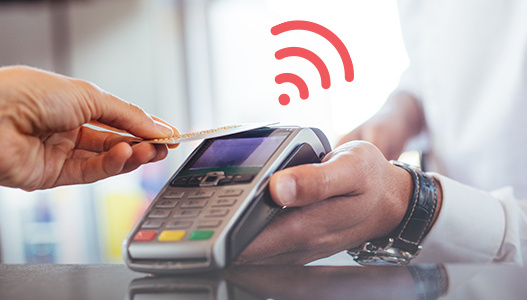For The Security Of Your Money
PIN code
The entry of your Personal Identification Number (PIN) at the ATM or POS keyboard will have the effect of legally valid electronic signature.
Therefore, it is especially important to keep your PIN secret and take all necessary precautions against its disclosure to third parties. It is imperative that you not keep the PIN in a way that may enable third parties to get to know it, including by writing it on the bank card, saving it in your phone, or indicating it on any item you carry with the card.
Card and PIN security:
- Never write the PIN on the card or on an item kept close to it;
- Destroy the envelope containing the PIN as soon as you save the code;
- If, when receiving the PIN, you notice that the envelope is not sealed, immediately call the bank;
- Your PIN is only known to you. Never communicate your PIN to anyone, including a bank employee;
- You can change your PIN at any ATM in Bulgaria. It is not advisable to use for that purpose consecutive digits, birth dates or phone numbers;
- Do not give, transmit or make the card accessible to third parties, including members of your family;
- Upon the receipt of the card from the bank, immediately affix your signature on its back in the box designated for your signature;
- Protect your card from mechanical damage.
ATM cash withdrawal
- Prepare your card in advance, look around or wait for the customer in front of you to finish, leaving a reasonable distance between you. If you are abroad, make sure in advance that the ATM is marked with the logo of the card organization indicated on your card;
- When entering the PIN, cover the keyboard with your hand and make sure you are not seen by anyone in your immediate vicinity;
- Do not count money in front of the ATM, but in another secure place;
- If you have any problem with the transaction, never trust a nearby person who offers you their help;
- If you think something is wrong, cancel the transaction and use another ATM;
- Always take your receipt and if you are concerned about the remaining balance, you can contact the bank;
- Keep in mind that some information about your card is written on the receipt, so destroy it before discarding it.
Card payments via POS at a merchant's retail outlet
- Make sure that the merchant is authorized to accept card payments;
- Never lose sight of your card until the operation is completed. If possible, slide the card yourself through the POS card reader. If your card is contactless and the merchant accepts contactless payments, ask to make the transaction by yourself by tapping the card near the POS instead of giving it to a merchant's operator;
- Do not provide your card to others; if you need to pay by it at a retail outlet, do not allow anyone to operate your card without your supervision;
- When paying by card at a retail outlet, make sure that the amount written on the receipt from the POS terminal is correct. When entering the PIN, cover the keyboard with your hand and make sure you are not seen by anyone in your immediate vicinity.
- For no reason should you enter your PIN on the Internet or email it. The PIN is only used on ATMs and POS devices;
- Avoid entering your personal bank card data on computers that are used by others;
- Only enter your card data into secure websites;
- When making online purchases or bookings, before effecting the payment, make sure you are familiar with all the conditions associated with it – Merchant's Terms of Service, delivery terms and goods return policy, cancellations and disputes, etc. Be careful and make sure you allow the merchant to only debit your account by the amount of the specific purchase.
- For no reason should you enter your PIN on the Internet or email it.
- The PIN is only used on ATMs and POS devices;Avoid entering your personal bank card data on computers that are used by others;Only enter your card data into secure websites;
- When making online purchases or bookings, before effecting the payment, make sure you are familiar with all the conditions associated with it – Merchant's Terms of Service, delivery terms and goods return policy, cancellations and disputes, etc.
- Be careful and make sure you allow the merchant to only debit your account by the amount of the specific purchase.
DEAR CUSTOMERS,
We would like to inform you that CCB AD does not send emails inviting you to update your accounts or to submit your personal data, such as passwords, usernames, card data, etc.
Such messages should be considered an attempt to misuse. Do not open the links listed therein and do not give your personal or financial information.
Do not provide your personal data and information related to the access to your Internet banking, your bank account, card data, etc.
Access passwords are personal and it is your duty and responsibility to keep them known only to you.
If you have received an email sent by "CCBank.bg" clients@ccb-online.bg or similar, please do not open the email, its attachments and the links contained therein.
The message WAS NOT SENT by CCB AD – it is a malicious attempt for the so-called "fishing" attack and aims to collect customer information.
In such cases, we recommend that the customer take the following actions:
Scanning the computer using licensed anti-virus software;
Regular system updating, using only licensed and purchased software;
Changing the password for email access with a complex password (containing at least 10 characters: uppercase and lowercase letters, numbers and reserved characters).
We would like to ask anyone who has received such emails not to reply to them and if already replied, to immediately contact a Bank’s representative by telephone: *5050 (02) 9266 500
0889 934 694
Additional CCB services for ensuring the security of your card
We recommend that you use the additional services we offer to better protect your card.
- The SMS Detective service provides you with protection against fraud and misuse of your card. You will receive an SMS immediately after using your card at the time of payment at a point of sale, on the Internet, or in case of cash withdrawals. If you receive a SMS for a transaction that you have not ordered, immediately call the bank's 24-hour phones to block your card;
- With CCB E-Secure service you get extra protection when shopping online with your card. After signing up for the E-Secure service, when you shop on websites that accept payments via MasterCard SecureCode, you'll go through one additional step – you must enter an additional Internet payment password known to you only. This password is different from the CVV/CVC code and unlike it, it is not printed on the card. The password is not known to anyone and is not accessible in any form by the merchant, unlike the other card data entered upon the purchase
- Mobi-B – with Mobi-B you can lock and unlock your CCB cards yourself. With one touch, you can disable purchases and withdrawals with your card and unlock it only when you want to use it. The locked card is banned not only for Mobi-B payments, but also for standard transactions made with the bank card.
More information about your card security
- Check your card presence often and if you cannot find it, call the bank;
- In the event that your card is lost or stolen, immediately call the bank or BORIKA to the 24-hour operators to block the card;
- If your card is held within an ATM, call the bank immediately. Even if you get your card directly from the branch servicing the ATM (if the ATM is located at the entrance of a bank branch) it is again necessary to notify CCB AD of the incident;
 Central Cooperative Bank
Central Cooperative Bank 
